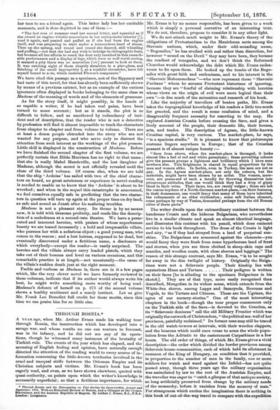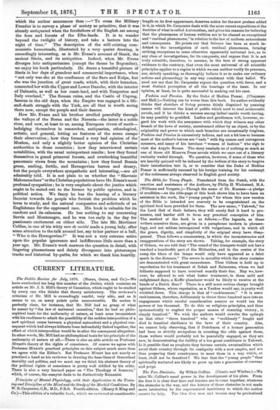THROUGH BOSNIA.*
A YEAR ago, when Mr. Arthur Evans made his walking tour through Bosnia, the insurrection which has developed into a savage war, and whose results no one can venture to forecast, was in its infancy, and he did not see any of its opera- tions, though he witnessed many instances of the brutality of Turkish rule. The events of the year which has elapsed, and the arousing of English feeling and opinion, have naturally enough directed the attention of the reading world to every source of in- formation concerning the little-known territories involved in the cruel and unequal strife between the Ottoman Empire and its Christian subjects and victims. Mr. Evans's book has been eagerly read, and even, as we have shown elsewhere, quoted with quasi-authority, on points upon which the writer's knowledge is necessarily superficial; so that a fictitious importance, for which • Through Bosnia and the Herzegovina on Foot during Me Insurrection, August and Beptember. 1875. With an Historical Review of Bosnia, and a Glimpse at the Croats, Slavenians, and the Ancient Republic of Ragusa. By Arthur J. Evans, RA., F.S.A. London: Longman&
Mr. Evans is by no means responsible, has been given to a work which is simply a personal narrative of an interesting tour.
We do not, therefore, propose to consider it in any other light. We do not attach much weight to Mr. Evans's theory of the obligations of Protestantism to the Manichwan sects among the Slavonic nations, which, under their odd-sounding name, " Bogomiles," he has studied with zeal rather than discretion, for however "sound on the Devil" they may have been, they became the readiest of renegades, and we don't think the Reformed Churches would acknowledge the debt which Mr. Evans endea- vours to fix upon them. He looked up the tombs of the Bogo- miles with great faith and enthusiasm, and to his interest in the "Slavonic Mahommedans "—who now represent those "Slavonic Puritans" whom he accuses Protestant historians of ignoring, because they are "fearful of claiming relationship with heretics whose views on the origin of evil were more logical than their ewn "—is due much of the animation and research of his book. Like the majority of travellers off beaten paths, Mr. Evans takes the topographical knowledge of his readers a little too much for granted, and the result is some confusion of mind, and a disagreeably frequent necessity for resorting to the map. He explored Austrian Croatia before crossing the Save, and gives a lively account of the people, their domestic life, their houses, arts, and trades. His description of Agram, the little-known Croatian capital, is very curious. The market-place, he says, "is a spacious studio." It is pleasant to know that picturesque costume lingers anywhere in Europe ; that of the Croatian peasant is of almost unique beauty :—
" Seen from above, when the market-place is thronged, it looks almost like a bed of red and white geraniums • these prevailing colours give the peasant groups a lightness and brilliancy which I have seen nowhere else. This brightness is shared in equal proportions by the men and women alike. In Serbia, even in Turkey, the men are not so gay. In the Agram market-place, not only the colours, but the materials, might have been chosen by an artist. The women, more- over, are possessed of such a faculty for throwing themselves into picturesque attitudes, that one would think they had a drop of gipay blood in their veins. Their faces, too, are rarely vulgar ; these are not the coarse hoydens of a North-German market-place,—on their features, in their demeanour, one would fancy that many of them have inherited the refinements of an older civilisation • some soft Italian element, come perhaps by way of Venice, descended perhaps from the old Roman cities of these parts."
The writer dwells upon the extraordinary contrast between the handsome Croats and the hideous Bulgarians, who nevertheless live in a similar climate and speak an almost identical language, and illustrates this contrast with his pencil, which does eminent service to his book throughout. The dress of the Croats is light and airy, " as if they had strayed from a land of perpetual sun- shine. The Bulgarians are armoured against the elements—you would fancy they were fresh from some hyperborean land of frost and storms, when you see them clothed in sheep-skin caps and mantles, and woollen coats, with close sleeves and leggings." The reason of this strange contrast, says Mr. Evans, "is to be sought far away in the dim twilight of history. Originally the Bulga- rians were not a Sclavonic people Their kinship lies with mysterious Huns and Tartars Their pedigree is written on their faces [he is alluding to the specimen Bulgarians in his sketch]. They are of that type, more easily recognised than described, Mongolian in its widest sense, which extends from the White-Sea shores, among Lapps and Samoyeds, Beormas and Voguls, to the Tartars and Chinese. These are the Ugrians, the
ogres of our nursery-stories." One of the most interesting chapters in the book—though the tour proper commences only on the Turkish side of the Save—is devoted to the Granitza, as
its " Sclavonic denizens" call the old Military Frontier which was originally the outwork of Christendom, "the political sea-wall of her provinces, painfully reclaimed." Its former uses may still be traced in the old watch-towers at intervals, with their wooden clappers, and the beacons which could once rouse to arms the whole popu- lation from the Adriatic to the easternmost Carpathians in a few hours. The old order of things, of which Mr. Evans gives a vivid description—the order which divided the border provinces among Sclavonic house-communities, each of which held its allotment in common of the King of Hungary, on condition that it provided, in proportion to the number of men in the family, one or more soldiers for watch and ward against the Infidel—has not quite passed away, though three years ago the military organisation was assimilated by law to the rest of the Austrian Empire, and the traveller was eager to "catch a glimpse of that antique society, so long artificially preserved from change by the military needs of the monarchy, before it vanishes from the memory of man."
For strangeness which excites the imagination there is nothing in this book of out-of-the-way travel to compare with the expedition which the author announces thus :—" To cross the Military Frontier is to survey a phase of society so primitive, that it was already antiquated when the forefathers of the English sat among the fens and forests of the Elbe-lands. It is to wander beyond the twilight of history, and take a lantern into the night of time." The. description of the still-existing com- munistic homesteads, illustrated by a very quaint drawing, is exceedingly interesting, as is Mr. Evans's account of Siszek, the ancient Siscia, and its antiquities. Indeed, when Mr. Evans diverges into antiquarianism (except the theme be Bogomiles), we enjoy his book particularly. He draws a beautiful picture of Simla in her days of grandeur and commercial importance, when "not only was she at the confluence of the Save and Knipe, but she was the junction of great roads, which, with their branches, connected her with the Upper and Lower Danube, with the interior of Dalmatia, as well as her coast-land, and with Nauportus and Italy overland." The Roman ruins, and the Castle of Caprag, , famous in the old days, when the Empire was engaged in a life- and-death struggle with the Turk, are all that is worth seeing there now, except the people and their dances.
How Mr. Evans and his brother strolled peacefully through the valleys of the Bosna and the Narenta—the latter is a noble river, and new, at least to us, among European rivers of merit— indulging themselves in researches, antiquarian, ethnological, artistic, and general, letting no features of the scene escape their observation ; how they formed a very bad opinion of the Moslem, and only a slightly better opinion of the Christian authorities in those countries ; how they interviewed certain notabilities, with the usual unimportant results ; how they found themselves in grand primeval forests, and overlooking beautiful panoramic views from the mountains ; how they found Bosnia green, smiling, fertile, and Herzegovina barren and dreary, but the people everywhere sympathetic and interesting,—are all admirably told. It is not plain to us whether the "Slavonic Mahommedans" or the Christian populations have Mr. Evans's most profound sympathies ; he is very emphatic about the justice which ought to be meted out to the former by public opinion, and in political action. We fancy he has the leaning of a literary theorist towards the people who furnish the problem which he loves to study, and the natural compassion and solicitude of an Englishman for the oppressed race. His book is valuable for its candour and its calmness. He has nothing to say concerning Servia and Montenegro, and he was too early in the day for passionate excitement on either side. The late Mr. Mortimer Collins, in one of his witty vers de societi made a young lady, after some attention to the talk around her, say to her partner at a ball, "Who is the Herzegovina?" It was not a very extreme satire upon the popular ignorance and indifference little more than a year ago. Mr. Evans's work answers the question in detail, with lingering pleasantness and dainty divergence into picturesque tracks and historical by-paths, for which we thank him heartily.































 Previous page
Previous page